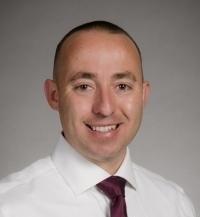- Research Assistant Professor, Obstetrics & Gynecology

850 Republican St. S2-20
Box 358055
Seattle, WA 98109
Germán currently holds a Research Assistant Professor in the Department of Obstetrics and Gynecology at the University of Washington, where he contributes to the scientific advancement in areas such as pathogenesis of HIV/AIDS and other sexually transmitted diseases as well as broader aspects of human immunology. A large part of his graduate work in the US was published in the Proceedings of the National Academy of Sciences of the USA. In the PNAS paper, published in 2015, he discovered and mechanistically defined the pathways regulating expression of CCR5, one of the two main HIV co-receptors, on T cells. His strong interest in both immunology and genetics prompted him to continue his postdoctoral training in Dr. David Russell’s lab at UW’s Department of Hematology. In his Nature Biotechnology paper, published in 2017, he reported on the design and creation of universal pluripotent stem cells. He engineered these cells to not be rejected by the immune system based on MHC incompatibilities but also to not be recognized by NK cells. The creation of universal stem cells that can be given to different individuals as a single drug rather than individualized for each patient holds great promise for regenerative medicine applications. He was recruited to the Dept. of Obstetrics and Gynecology in 2017. On July 1st, 2023, he became appointed as Research Assistant Professor.
He is very excited to be able to apply his extensive experience in genomics and mucosal immunology to the HIV/AIDS field. His long-standing interest is to develop novel strategies to interfere with the HIV reservoir and potentially to be able to eradicate HIV-1 in people living with HIV (PLH). Some of his work at UW has centered on primary epithelial cells derived from the female lower reproductive tract. He spearheaded experiments that are beginning to unravel the mechanisms of endogenous HIV-1 reactivation. For his 2020 Journal of Virology paper, he set up difficult experiments that involved working with mucosal tissues, establishing primary mucosal epithelial cell lines from patients, and conducting complex ex vivo co-cultures with various read-outs to dissect the endogenous stimuli provided by the mucosal tissue environment to latently HIV-infected cells. He was also second author of a study in Retrovirology that characterized deficiencies in cellular innate immune responses inherent to cells latently infected with HIV-1. This work revealed a previously unknown role for type 1 IFN in regulating HIV latency, which may be exploited to design curative therapies aimed at eradicating the reservoir. In both of these projects, he gained experience in mucosal immunology, HIV-1 latency, and analysis of innate immunity, including the interferon system.
Besides his contribution to science, he has actively been involved in teaching and mentorship. He was awarded with the Visiting Faculty Research Award to teach a post-graduate course on placenta, epigenetics and STIs in the summer of 2018, fall of 2020, summer of 2021 and fall of 2022 at the University of Buenos Aires, Argentina. To highlight his passion for guiding younger scientists, he was selected as a 2021 mentor for the International AIDS Society; only 10 mentors in the world are chosen per year. He currently coordinates (and directly supervises) URM undergraduate research internships at UW for programs like MESA (Mathematics/Engineering/Science Program at Seattle Central College) and LSAMP (Louis Stokes Alliances for Minority Participation at North Seattle Community College). He has a very strong commitment to the advancement of a career in science in URM students and scientists.
- Biochemist, School of Pharmacy and Biochemistry, University of Buenos Aires, Argentina
- PhD, University of Texas Health Science Center at San Antonio
- Effects of opioids on HIV/AIDS pathogenesis
- Epigenetics and Gene Expression
- HIV Latency and Cure
- Mucosal Immunology